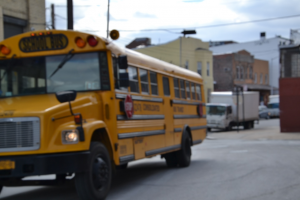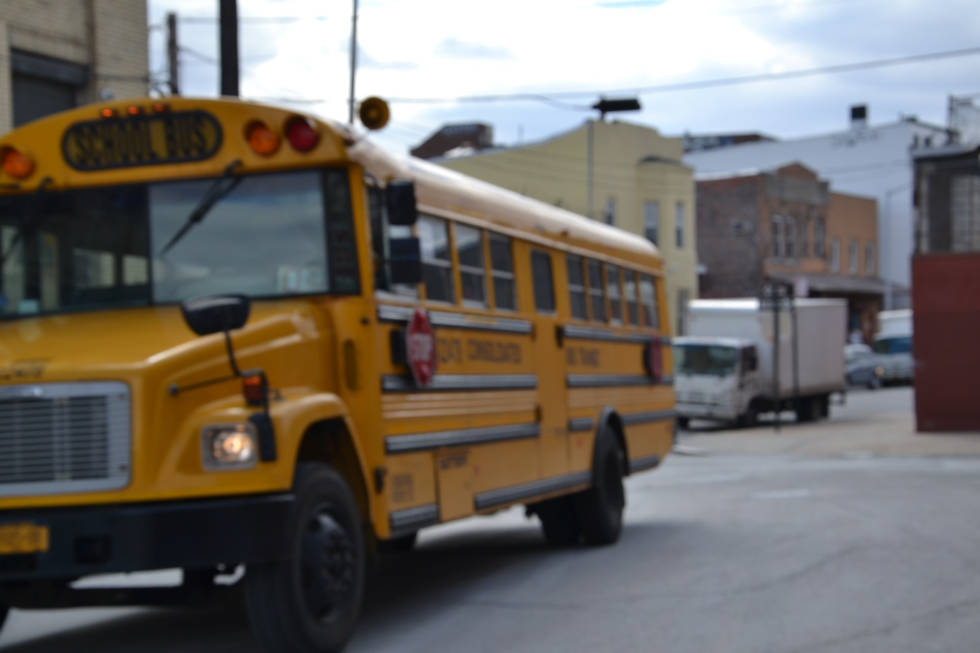This post is also available in Dutch.
Getting out of bed for school is a teenager’s daily nightmare. “Don’t be so dramatic—just go to bed earlier!” But science says it’s not that easy for teens…

Groggy teens catching the school bus in New York City. Image(rights) by Fenny Zwart
To understand how bedtime works for the teenage brain, we first need to know a bit more about the biology of our sleep rhythms. Humans— and other animals– have a natural cycle of sleep and wakefulness, also known as our ‘body clock’. For us humans, this body clock follows a cycle of roughly 24.5 hours. This means that if we would live in complete darkness, our bodies would follow a 24.5-hour day. This would mean that our days would shift roughly 30 minutes every day.
Melatonin, the sleep regulator
Luckily, we have a hormone that helps us regulate our sluggish body clocks. This hormone is called ‘melatonin’ and is influenced by (day) light. The more our eyes are exposed to light, the more our melatonin levels drop. So once it starts getting dark, our melatonin levels begin to rise and this makes us feel more and more sleepy.
In healthy adults, melatonin levels start to rise in dim light, usually around 9 p.m., which is when feelings of sleepiness begin to kick in. Melatonin peaks between 2 and 4 in the morning, after which it begins to drop. This leads to a habitual wake-up time at around 7 a.m. Of course we all have our own preferences, and this might include our body clock. For instance, research has shown that these sleep processes occur about two hours earlier for a morning person than for an evening person.
The teenage body clock
Now teens are a special exception. Puberty is characterized by huge hormonal changes that allow us to transition from children into adults. These changes also include changes in our sleep helper, melatonin. Therefore, when melatonin levels are messy, this also means our body clock, which tells us when to sleep, becomes messed up as well.
Sleep researchers have found that the teenage body clock is delayed up to two hours, when compared to the adult body clock. This means that teens won’t feel sleepy until around 11 p.m. This also means that asking a teenager to wake up at 7 a.m. is like asking an adult to wake up at 5 a.m.! Many of us would not be happy setting our alarm clocks that early every morning…
No wonder many teens don’t get the nine hours of sleep they actually need, when classes begin too early. Researchers therefore recommend that school should start later, and shouldn’t start any earlier than 8:30 a.m. High schools in the U.S.A. have started experimenting with later school times, followed by schools in the U.K. Their findings? Teenagers got more sleep and both school absence and the number of drop-outs decreased, whereas academic performance increased. Moreover, rates of depression and drug and alcohol abuse decreased. A bit more sleep greatly improves the mental and physical health of teens.
So to all teens, you guys are definitely in the right, even science says later school times can improve your health!
Want to know more? See this 10 minute TED-talk from a sleep scientist!
* Funny fact: We have another sleepy peak during the day, between 1 p.m. and 3 p.m.; therefore, we should actually all take a nap in the early afternoon!
Written by Fenny Zwart. Editing: Marpessa Rietbergen
